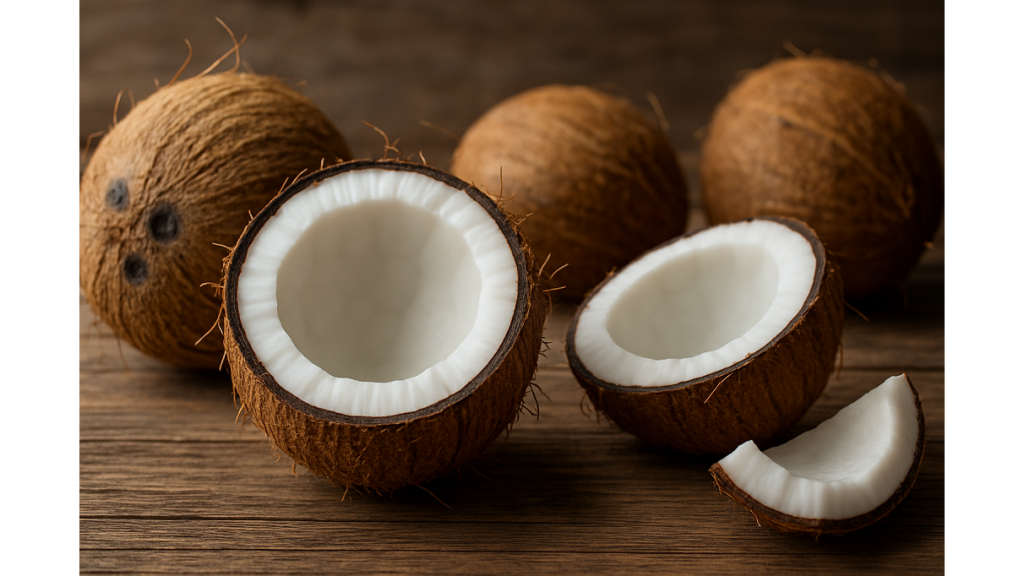How coconut products can fuel economic growth across CARICOM and reduce import dependency
The Coconut Comeback
Coconuts have always held a special place in Caribbean culture, cuisine, and commerce. But in recent years, the humble coconut has transformed into a multi-billion-dollar global industry, with products ranging from virgin oils and bottled water to cosmetics, desiccated coconut, and plant-based dairy alternatives.
For the 15 CARICOM member states, coconut represents a rare opportunity: a locally grown super-crop with high export value, massive regional demand, and low perishability when processed. Coconut is no longer a subsistence crop — it’s a driver of modern agro-processing and intra-regional trade.
Global Market Snapshot: Why CARICOM Must Act Now
The global coconut product market is expected to reach USD $31.1 billion by 2028, driven by:
-
Growth in vegan and dairy-free markets
-
Demand for natural personal care items
-
Functional foods and beverages
-
Preference for clean-label ingredients
Countries like the Philippines, Indonesia, and India dominate exports — but CARICOM has the climate, land, and labor force to compete meaningfully, especially for regional demand and premium "Caribbean origin” branding.
CARICOM Member States With High Coconut Production Potential
| Country | Current Production Status | Export Potential |
|---|---|---|
| Saint Lucia | Revitalized farms; high rainfall | Coconut oil, cream |
| Dominica | Traditional grower; hurricane recovery ongoing | Virgin coconut oil, bottled water |
| Guyana | High-volume producer | Desiccated coconut, activated carbon |
| Belize | Agro-processing investment growing | Coconut flour, cosmetics |
| Jamaica | Home to premium coconut brands | Milk, water, snack bars |
| Trinidad & Tobago | Emerging processors, local demand | Ready-to-drink coconut water |
Several of these countries have been supported through the Caribbean Agricultural Research and Development Institute (CARDI) and EU-funded coconut revitalization programs.
High-Demand Coconut Products in the Region
1. Coconut Water (RTE Bottled)
-
Popular in Barbados, Antigua & Barbuda, and The Bahamas (high tourism impact)
2. Coconut Oil (Virgin/Refined)
-
Used across CARICOM in cooking, cosmetics, and therapeutic health
3. Coconut Milk/Cream (Canned & Powdered)
-
Needed by hospitality industries in Grenada, Suriname, and St. Kitts
4. Coconut Sugar & Flour
-
Premium health substitutes increasingly used in Belize and Trinidad
5. Coconut-Based Personal Care Items
-
Soaps, moisturizers, shampoos popular across urban CARICOM markets
Trade Synergies: Supply Meets Demand
CARICOM states like Guyana, Jamaica, and Saint Lucia could meet the coconut-based product demand in Barbados, Bahamas, and Suriname, reducing dependence on extra-regional imports from Asia or the U.S.
Example:
-
Guyana's desiccated coconut could replace imports currently sourced from the Philippines to Barbados bakeries and foodservice companies.
Agro-Processing: Where the Real Money Is
Instead of exporting raw coconuts, CARICOM nations should invest in value-added processing facilities. Consider the profit multiplier:
| Product | Raw Value (USD/kg) | Processed Value (USD/kg) |
|---|---|---|
| Fresh coconut | $0.25 | - |
| Virgin coconut oil | - | $8–$12 |
| Coconut flour | - | $4–$6 |
| Coconut chips/snacks | - | $6–$10 |
With proper cold storage, packaging, and traceability, B2B trading via CaricomMarket.net can unlock these margins for small and mid-sized vendors.
Certifications & Standards
To attract international and premium regional buyers, vendors should align with:
-
HACCP and ISO 22000 food safety standards
-
USDA Organic or EU Organic (where feasible)
-
Proper labeling for allergen and ingredient transparency
CaricomMarket.net can assist vendors with compliance tools and guides for trade documentation.
Target Buyers on CaricomMarket.net
-
Hotels and resort chains looking for coconut water, milk, oil
-
Health food distributors in Trinidad, Bahamas, Barbados
-
Cosmetic manufacturers sourcing Caribbean oils
-
Supermarkets and gourmet stores seeking private-label goods
Logistics: Making Inter-Island Coconut Trade Viable
Transportation and handling costs are key considerations. CaricomMarket.net encourages:
-
Vendor clustering near processing zones
-
Use of consolidated shipping containers
-
Cross-border partnerships for last-mile delivery
-
Access to cold-chain logistics for fresh water and milk
Marketing Tips for Vendors
To increase B2B sales success:
-
Use high-quality product imagery
-
Include farm traceability and sustainability story
-
Offer bulk B2B discounts (e.g., 10L drums of coconut oil)
-
Clearly state lead times, MOQ (minimum order quantity), and shipping zones
-
Provide co-packing options for private label partners
Coconuts Can Drive the Caribbean’s Next Agro-Export Boom
The coconut sector holds massive untapped potential for intra-regional trade, agro-processing innovation, and export growth in the CARICOM bloc. By moving away from raw coconut exports and toward premium, value-added items, the region can capture higher margins, support local farmers, and fuel sustainable development.
Platforms like CaricomMarket.net are perfectly positioned to support this coconut renaissance by connecting growers, processors, buyers, and logistics providers across the region.




Share this via
Or copy link